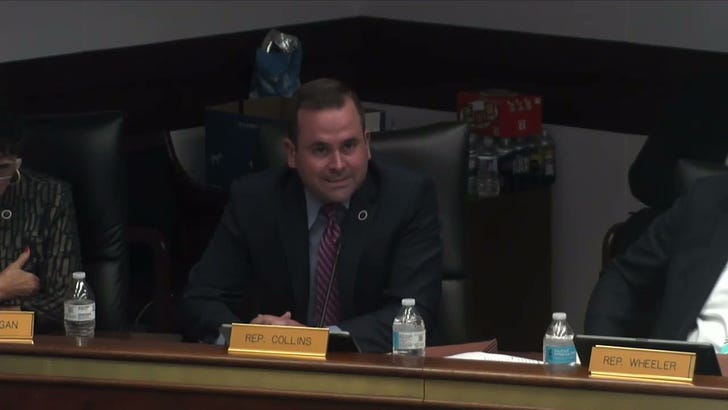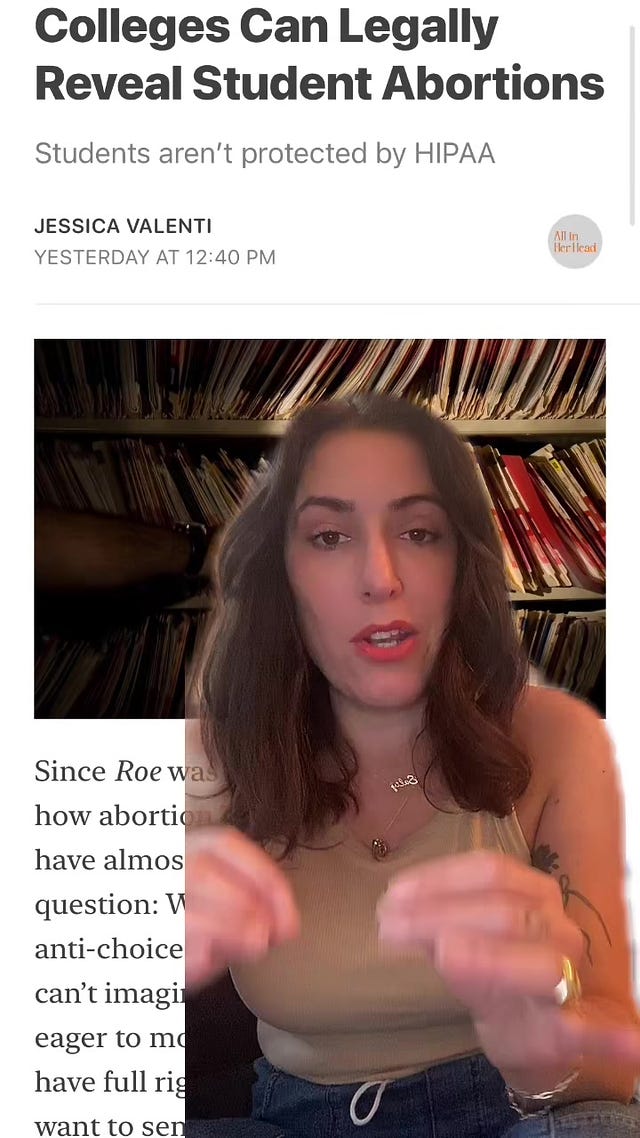Republicans in South Carolina are debating an extreme abortion ban with no exceptions for rape or incest. At the state’s House Judiciary Committee, Rep. Neal Collins argued for changes to the bill, and got choked up talking about a teenager who nearly lost her uterus because of an anti-abortion law that he voted for. I’m glad he realizes the damage extreme laws do, but I’ve gotta be honest—his tears don’t mean shit to me.
In Indiana, where an abortion ban is about to take effect, sex education advocacy groups are pushing for better and more comprehensive lessons and resources in schools. Right now, the state is (unsurprisingly) lacking. Indiana Family Health Council CEO Dr. Kristin Adams says, “there is nothing that says sex ed must be taught and if it is, then it must be done at the abstinence focus.” I continue to believe that not offering kids accurate sex education is a human rights violation: You are talking about their health and futures. Prepare them accordingly!
Love this: In West Virginia, we can in part thank activist intervention for why Republicans weren’t able to pass a state abortion ban: Activists showed up at the capitol while lawmakers debated, protesting for over 11 hours. “I don’t care what anyone says. If we weren’t here, this wouldn’t have happened. Do not tell me protest and emails to legislators do not work. I just saw it,” one abortion escort tweeted about the action.
I told you yesterday about a Louisiana woman who was denied an abortion despite a severe fetal abnormality. The good news is that the woman is going to be able to get the abortion care she needs. The absolutely infuriating and frustrating news, however, is that the state lawmaker who ‘allowed’ the procedure claims, “This woman is not seeking an abortion.” Say again?
Sen. Katrina Jackson, who wrote the state’s strict ban, continued, “This woman is seeking a medical procedure for a pregnancy that is not viable outside of the womb.” Right, and that medical procedure is called an abortion. No matter how hard anti-choicers want to make it so, abortion is not an intention, it is a medical intervention to end a pregnancy.
In Tennessee, officials in Nashville are using local ordinances to decriminalize abortion as much as is legally possible: Among other resolutions, the city has banned the use of license plate reader data from being used to criminalize those traveling out-of-state for abortions, and is requiring companies seeking incentive grants to disclose whether their health plan includes travel reimbursement for those seeking abortion. And in Phoenix, the city council is expected to take similar steps to soften the blow of the state’s ban, specifically banning the use of city funds to go after abortion cases.
People who need methotrexate to manage arthritis pain or to help complete miscarriages are having a hard time filling prescriptions for the medication. Dr. John Thoppil, an OBGYN in Texas says, “People are individually interpreting laws and women are definitely going to get hurt by the delay of care.”
The Florida prosecutor who was suspended by Gov. Ron DeSantis for saying he wouldn’t go after abortion cases is suing to get his job back. At a press conference, Andrew Warren said, “If the governor’s allowed to do this, what’s left of democracy? If the governor’s allowed to retaliate against me for speaking out, what’s left of the First Amendment?” (Related: Democrats in Florida are trying to warn voters that DeSantis plans to all-out ban abortions after the November election.)
We’ve been talking a lot about digital privacy lately. How about digital censorship? A coalition of organizations—including Amnesty International, Planned Parenthood and Human Rights Watch—have signed onto a letter to Meta CEO Mark Zuckerberg, demanding that the company stop censoring reproductive rights related content. From the letter:
“Numerous media organizations have reported that Meta-owned platforms Facebook and Instagram have taken down posts explaining how to access abortion pills. Given the reports that Meta has blocked content related to reproductive health and rights, as well as a lack of clarity around what constitutes correct or ‘incorrect’ enforcement, we are concerned that these Community Standards are inadequate in terms of protecting the rights of users to seek, receive, and impart information related to sexual and reproductive health and rights.”
This is very scary stuff: Model legislation from the National Right to Life Committee wants to make it a felony to publish anything “knowing that the information will be used, or is reasonably likely to be used to induce or obtain an abortion.” Which means that if a newspaper published a piece about abortion medication, for example, and mentioned an organization that provides it—or even named the kind of medication used—they could be criminally liable.
To be clear, just because it’s model legislation doesn’t mean it’s not dangerous. NRLC is a major anti-abortion player; and a similar bill has already been introduced in South Carolina. In response, news organizations have sent a letter to Attorney General Merrick Garland urging him to take preventative action to ensure that journalists aren’t targeted.
Progressive Democrats aren’t loving that Sen. Tim Kaine is taking a leadership role in the fight for abortion rights—especially since Kaine is personally against abortion and takes a moderate approach on the issue. One unnamed operative sort of says it all:
“After Kansas, the idea that a pro-life white male senator has emerged as the face of the Democratic response by pushing legislation that falls far short of codifying Roe and still has no chance of passing is just impossible to justify.”
POLITICO looks at state Supreme Court races and how they’ll impact abortion; a group of teen activists, Generation Ratify, believe the best way to protect abortion rights is to pass the Equal Rights Amendment; and men are loathe to talk about their experience with abortion because of the stigma still attached to the issue.
Also: Related to my piece yesterday about the limited privacy rights given to college students, here’s an article about HIPAA and its role in protecting abortion patients.
Researchers and doctors are trying to raise the alarm about what abortion bans will mean for Black women. Namely, that the laws will kill them. They also want people to make the connections between maternal mortality, reproductive justice, racism and healthcare more broadly. From Arizona OBGYN Dr. DeShawn Taylor:
“Talking in isolation about Black women’s access to abortion is such a narrow lens. We’re not addressing why Black women have an increased risk of dying from pregnancy. And so yes, Black women need access to abortion, but also Black women need access to health care.”
Since Roe was overturned, lots of people have been announcing new kinds of activism and initiatives to help folks get access to abortion—which is great! What’s not great, is that not all of them seem above board. The good news is that Jezebel is on it.
The Annenberg Inclusion Initiative at the University of Southern California—known for focusing on representation of marginalized groups in pop culture—announced that it will start to study the way that film, television and other media portray abortion. They will also offer suggestions about how media can improve those portrayals.
Thought I’d throw this in the middle here. Guess who finally joined TikTok? ;)
 Tiktok failed to load.
Tiktok failed to load.Enable 3rd party cookies or use another browser
Rolling Stone has a good piece on the confusion over Michigan’s abortion law, and how extremist anti-choice prosecutors are doing their best to take advantage of that chaos; and The Texas Tribune has an in-depth article about the history of abortion law in the state—going all the way back to the 1800s. ) It’s super fascinating stuff; definitely worth a read.)
Eric Reinhart at Slate—who also happens to be a physician—has a really great piece on how doctors can mess with billing and medical documentation to defy abortion bans:
Rather than recording abortion care under an individual doctor’s name, for example, the entire staff of a hospital or clinic could co-sign in open violation of repressive laws. Alternatively, we could together refuse to document or bill for abortion and prenatal care prior to fetal viability at twenty-four weeks’ gestation, instead filing this care under other medical billing codes and shifting its cost to the rest of our healthcare systems. Going further, to demand changes to unjust laws, we could strategically send public and private insurance systems into chaos within days via organized false billing without ever interrupting delivery of services to our patients.
Essentially: bureaucratic civil disobedience. I love it.
Sorry for the late publish today; it was my daughter’s birthday this week and we had a family dinner to celebrate. :)
Listen to this episode with a 7-day free trial
Subscribe to Abortion, Every Day to listen to this post and get 7 days of free access to the full post archives.
















